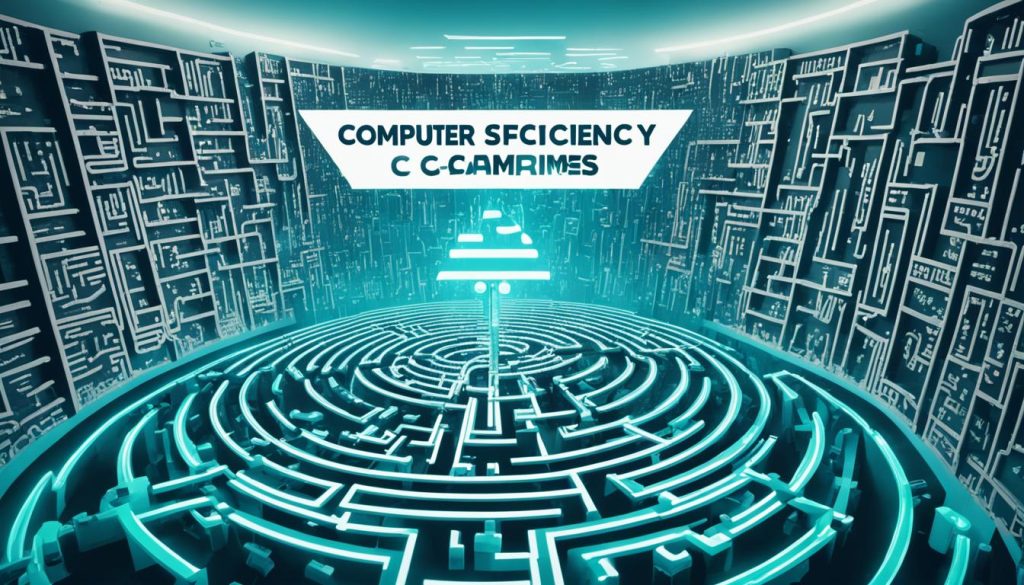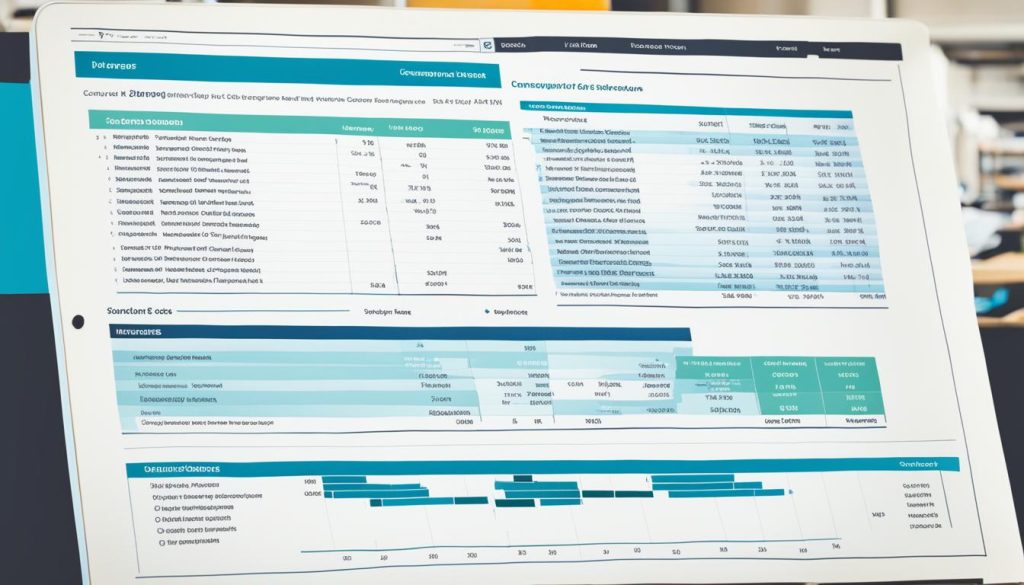Obtaining a Master’s Degree in Computer Science through distance learning offers flexibility and convenience for those looking to elevate their careers in the field. With the increasing demand for professionals with advanced knowledge in computer science, online programs have become an attractive option. Online programs, such as the one offered by Johns Hopkins University, provide a full range of dynamic instruction and skill-building opportunities for computer professionals, scientists, and engineers.
Students can choose from a variety of areas of study, including theory, analysis, design, and implementation of information systems, and tailor their education to their specific interests and career goals. With the option to engage in meaningful research and the guidance of top-level scientists and engineers, distance learning programs in computer science provide a comprehensive and rigorous education.
Key Takeaways:
- Distance learning offers flexibility and convenience for those pursuing a Master’s Degree in Computer Science.
- Online programs provide dynamic instruction and skill-building opportunities.
- Students can tailor their education to their specific interests and career goals.
- Distance learning programs offer the opportunity to engage in meaningful research.
- Top-level scientists and engineers provide guidance in distance learning programs in computer science.
Johns Hopkins Computer Science Program Overview
The computer science program at Johns Hopkins University is ranked #1 for Information Technology by U.S. News & World Report. The program offers a variety of online, part-time options for individuals looking to advance their careers in the field.
The curriculum covers a range of topics including theory, analysis, design, and implementation of information systems. Students have the opportunity to tailor their education by choosing a concentration or focus area, such as artificial intelligence, cybersecurity, or data science.
The program is structured and rigorous, providing students with the skills they need to make an impact in the field. Students also have the opportunity to engage in meaningful research through the Capstone course.
The faculty at Johns Hopkins are experts in their fields and provide one-on-one mentoring to students. Tuition and fees for the program can be covered by employer contribution programs, making it an affordable option for working professionals.
Program Highlights
- Ranked #1 in Information Technology by U.S. News & World Report
- Flexible online, part-time options
- Wide range of concentration areas
- Meaningful research opportunities
- Expert faculty mentors
By offering a comprehensive curriculum, hands-on research experiences, and individualized mentoring, the Johns Hopkins computer science program prepares students for success in the dynamic and evolving field of computer science.
| Program Features | Benefits |
|---|---|
| Flexible online, part-time options | – Allows working professionals to balance their education with their career – Provides convenience and accessibility for students from anywhere |
| Wide range of concentration areas | – Tailor education to match individual interests and career goals – Develop expertise in specialized areas such as artificial intelligence, cybersecurity, or data science |
| Meaningful research opportunities | – Engage in hands-on research projects through the Capstone course – Collaborate with top-level scientists and engineers |
| Expert faculty mentors | – Receive personalized guidance and support from leading experts in the field – Benefit from one-on-one mentoring and industry insights |
| Affordable tuition through employer contribution programs | – Access financial support through employer partnerships – Make pursuing a master’s degree more affordable |
Master’s Degree Concentrations
In the Master’s in Computer Science program at Johns Hopkins University, students have the opportunity to choose a concentration or focus area. These concentrations allow students to gain specialized knowledge in specific areas of computer science, tailoring their education to their career goals and interests.
Communications and Networking
Focus on the theory and practice of computer networks, data communication, and network security. Explore topics such as wireless networks, network protocols, and network optimization.
Artificial Intelligence
Delve into the exciting field of artificial intelligence, studying algorithms, machine learning, and natural language processing. Gain expertise in creating intelligent systems and solving real-world problems.
Bioinformatics
Combine computer science with biological research, analyzing and interpreting complex biological data. Learn how computational tools and techniques can enhance our understanding of biological systems.
Cybersecurity
Develop expertise in protecting computer systems and networks from unauthorized access, attacks, and data breaches. Explore topics such as cryptography, secure software development, and network security.
Data Communications and Networking
Focus on the design, management, and optimization of computer networks and data communication systems. Gain knowledge in network protocols, network performance analysis, and network architecture.
Data Science and Cloud Computing
Explore the intersection of data analysis and cloud technologies. Learn how to collect, analyze, and interpret large datasets using cutting-edge tools and techniques in cloud computing.
Database Systems and Knowledge Management
Focus on the design, implementation, and management of database systems. Learn about data modeling, query optimization, and database administration.
Enterprise and Web Computing
Gain expertise in building scalable and secure enterprise systems and web applications. Learn about software architectures, web development frameworks, and cloud-based solutions.
Human-Computer Interaction and Visualization
Study the design and evaluation of user interfaces and interactive systems. Explore techniques for creating intuitive and visually appealing interfaces that enhance user experience.
Research
Engage in cutting-edge research in computer science, working closely with faculty on innovative projects. Contribute to advancements in areas such as machine learning, cybersecurity, or data science.
Software Engineering
Focus on the principles and practices of software development, including software design, testing, and project management. Gain skills in creating reliable and efficient software systems.
Systems
Explore the design and implementation of computer systems, including operating systems, networks, and distributed systems. Gain a comprehensive understanding of how different components interact.
Theory
Deepen your understanding of the mathematical foundations of computer science. Study topics such as algorithms, computational complexity, and formal languages.
These concentrations provide extra focus within the Master’s in Computer Science program, allowing students to gain specialized expertise in their chosen area. By selecting a concentration, students can enhance their knowledge and skills to excel in their desired career path.
Computer Science Courses
As part of the computer science program at Johns Hopkins University, students have access to a diverse range of courses designed to provide them with the skills and knowledge needed in the field. These courses cover a wide range of topics, including:
- Mathematical tools for analyzing computer algorithms
- Deterministic and non-deterministic algorithms
- Important graphs and algorithms
- Data structures in scientific programming
- And more…
The courses are taught by subject-matter experts who are actively practicing the latest technologies and techniques in computer science. This ensures that students receive up-to-date instruction that is both relevant and applicable to real-world scenarios.
To help students plan their academic journey, the program publishes a comprehensive course schedule each term. This schedule outlines the required courses, prerequisites, concentrations, focus areas, and electives offered within the program. Students can refer to this schedule to choose courses that align with their interests and meet the requirements for their desired areas of specialization.
Here is a glimpse of the diverse range of courses available in the computer science program:
| Course | Course Description |
|---|---|
| CS 501: Introduction to Computer Science | An introductory course that covers the fundamental concepts and principles of computer science, including programming, algorithms, and data structures. |
| CS 502: Software Development and Design | A course that explores the principles and practices of software development, emphasizing design patterns, software architecture, and quality assurance. |
| CS 503: Database Systems | An in-depth study of database systems, covering topics such as relational database design, SQL programming, and data modeling. |
| CS 504: Artificial Intelligence | A course that explores the theory and applications of artificial intelligence, including machine learning, natural language processing, and computer vision. |
| CS 505: Cybersecurity | A comprehensive course focusing on the principles, techniques, and tools used to secure computer systems and networks from cyber threats. |

These are just a few examples of the courses available in the computer science program. By providing a diverse range of courses, the program ensures that students receive a comprehensive education that prepares them for the challenges and opportunities in the field of computer science.
Proficiency Exams
For students in Computer Science who have extensive experience in specific areas but haven’t completed the required prerequisites through formal college-level courses, the Engineering for Professionals program offers proficiency exams. These exams allow students to demonstrate their expertise and opt-out of certain prerequisites, enabling them to proceed directly to more advanced coursework.
By successfully completing the proficiency exams, students can save time and effort by skipping prerequisite courses and jump-start their education in their chosen specialization. This flexible option recognizes the value of hands-on experience and provides a pathway for individuals with a strong foundation in computer science to access higher-level courses.
Opting-out of prerequisites with proficiency exams is an excellent opportunity for experienced professionals to tailor their education to their specific needs and career goals. It allows them to focus on acquiring new knowledge and skills that align with the rapidly evolving demands of the computer science industry.

Through the Engineering for Professionals program, students can demonstrate their proficiency and take their computer science education to the next level without unnecessary repetition or delay. By offering an alternative route for those with practical experience, this approach helps professionals make the most of their time and maximize the benefits of their Master’s Degree in Computer Science.
Program Advisors
The computer science program at Johns Hopkins University is committed to providing students with the best support and guidance throughout their academic journey. Knowledgeable and supportive program advisors are available to assist students with any questions or concerns they may have. These advisors have a deep understanding of the program requirements, course offerings, and the overall curriculum. They can offer guidance on admissions, prerequisites, specialization options, and more.
Whether you have inquiries about the application process or need help choosing the right courses to meet your academic goals, our program advisors are here to help. Their expertise and experience can ensure that you make informed decisions and have a rewarding educational experience.
For more information and to connect with one of our program advisors, please visit the program advisor page on our website.

“The program advisors at Johns Hopkins University have been instrumental in my academic success. They have provided invaluable guidance and support throughout my journey, ensuring that I stay on track and make the most of my education.”
Benefits of Program Advisors
- Expert knowledge of the computer science program and curriculum
- Assistance with admissions requirements and application process
- Guidance on prerequisite courses and specializations
- Support in creating a personalized academic plan
- Help with course selection and scheduling
- Advice on career opportunities and pathways
Connect with a Program Advisor Today
Our program advisors are dedicated to helping you succeed in the computer science program. Don’t hesitate to reach out and take advantage of their expertise. Visit the program advisor page on our website to connect with an advisor and get the guidance you need to achieve your academic and career goals.
Tuition and Fees
When considering pursuing a computer science program, it is essential to understand the cost implications. The tuition and fees for the computer science program at Johns Hopkins University vary based on the specific courses and program options chosen. It is important to note that 78 percent of enrolled students have their tuition covered by employer contribution programs, making this program an affordable option for working professionals.
Computer Science Program Tuition:
The tuition for the computer science program includes the cost of instruction and access to online resources. Students can find detailed information about the cost of tuition for both prerequisite and program courses on the program’s website.
Online Program Tuition and Fees:
In addition to tuition, there may be additional fees associated with the online program, such as technology fees or registration fees. These fees are intended to cover the costs of maintaining the online learning platform and providing support services to students. It is advised to review the program’s website for a breakdown of these fees and any potential financial aid options.
Johns Hopkins University is committed to providing students with a comprehensive and affordable education in computer science. With the availability of employer contribution programs and potential financial aid options, students can find the support they need to pursue their education and advance their careers in this dynamic field.

| Program Component | Tuition | Fees |
|---|---|---|
| Prerequisite Courses | $X,XXX per course | $XXX per course |
| Program Courses | $X,XXX per course | $XXX per course |
| Total Program Cost | $XX,XXX | $X,XXX |
Conclusion
Pursuing a Master’s Degree in Computer Science through distance learning is a smart and convenient choice for individuals looking to advance their careers in the field. Programs like the ones offered by Johns Hopkins University provide a comprehensive and rigorous education, preparing students with the skills and knowledge needed to succeed. With options for virtual graduate degree programs and web-based learning, students have the flexibility to tailor their education to their specific interests and career goals.
One of the main advantages of distance learning MS in computer science programs is the flexibility they offer. With online master’s in computer science programs, students can study at their own pace from the comfort of their own homes, allowing them to balance their studies with their other commitments. This makes it an ideal option for working professionals or those with family obligations.
Additionally, online programs provide the opportunity to engage in meaningful research and collaborate with top-level scientists and engineers. Through virtual platforms, students can connect with their peers and faculty members, creating a dynamic learning environment. This collaboration can lead to exciting research opportunities and valuable networking connections.
With the increasing demand for professionals in computer science, obtaining a Master’s Degree through distance learning opens up new and exciting career opportunities. Graduates of online master’s in computer science programs are well-equipped to pursue various roles in industries such as technology, cybersecurity, artificial intelligence, and more. By acquiring a virtual graduate degree, individuals can position themselves for success in this fast-growing field.




No comments! Be the first commenter?